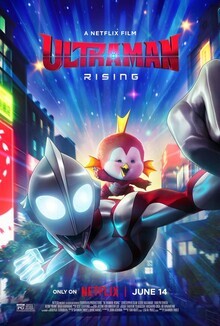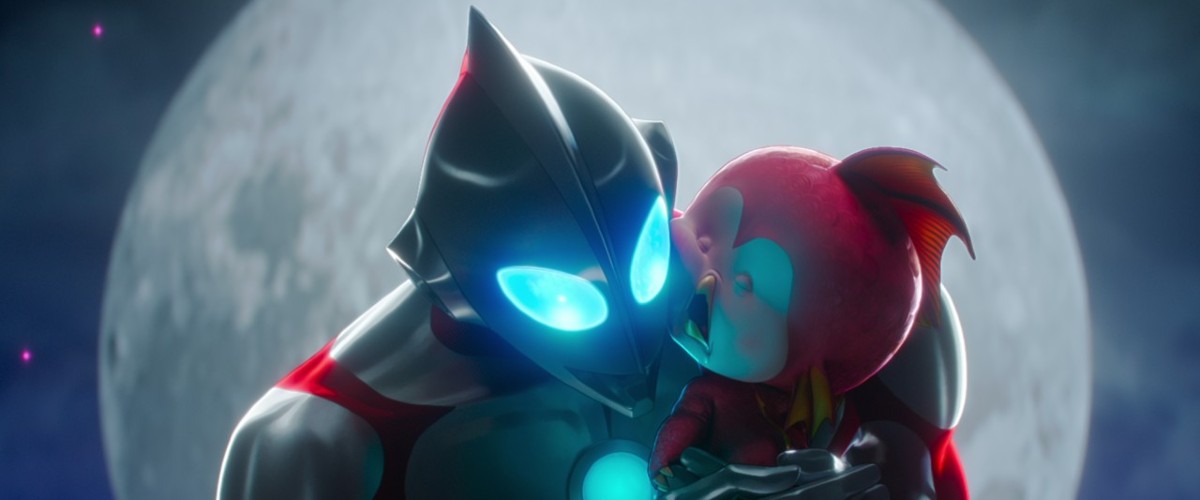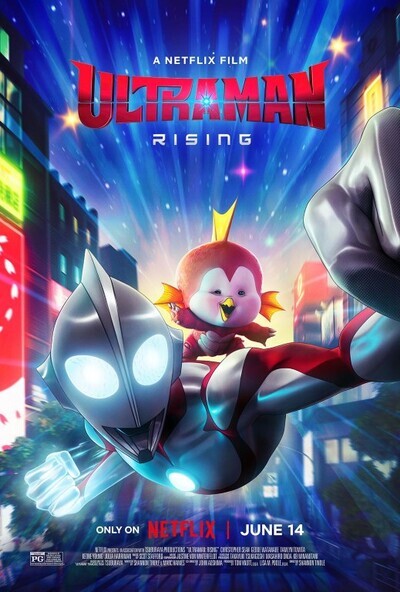
Ultraman: Rising
Ultraman: Rising

Now streaming on:
JustWatch
Children take center stage but aren’t the real stars of “Ultraman: Rising,” a new animated superhero fantasy about absent parents, lost kids, and other Pixar-entrenched stock types. The movie follows (but predictably differs) from “Shin Ultraman,” the most recent high-profile project featuring the 58-year-old alien hero. “Shin Ultraman” was more of a retro-modern redo of the original “Ultraman” series and its serial format. “Ultraman: Rising” aims squarely for a family-friendly mass audience, one that’s probably less concerned with the character’s previous incarnations. That’s not a major or concerning difference, though it’s sometimes frustratingly apparent given that so much of this new movie’s formulaic daddy issues drama recycles decades of pseudo-adult animated movie clichés.
This new Ultraman’s a brooding hero who must grow up to be truly great, which in this case means getting over his domestic hangups—angry with his dad and missing his mom—and also taking care of a giant baby dragon monster. The dragon’s cute and instantly amusing, partly because it doesn’t speak or have a character beyond its wild mood swings and heart-tugging character design. This new version of Ultraman is also not as charming, especially not when he’s a regular person with a family and other mundane concerns. That was never exactly Ultraman’s strong suit, though he still looks good when wrestling with monsters, robots, and other sci-fi menaces.
In “Ultraman: Rising,” baseball prodigy Ken Sato (Christopher Sean) serves as Ultraman’s alias. Ken tries and mostly fails to juggle both a major league career and a kaiju-battling calling. Ken’s arrogance defines him for a while, though that and a few other qualities seem only to matter whenever the plot needs an extra push. Our hero avoids his doting father, Professor Sato (Gedde Watanabe), because he blames his dad for not protecting his mom, who goes missing after an early scene. In that establishing flashback, Sato tells Ken that the key to being a hero is finding balance. So Ken takes it upon himself, with some help from his robot minder Mina (Tamlyn Tomita), to care for Emi, a baby kaiju discovered shortly after a battle with the dragon Gigantron. This puts Ken at odds with the stern Dr. Onda (Keone Young), the generically militaristic leader of the Kaiju Defense Force.
It takes a village to raise Ken, who rejects all of his father’s calls and doesn’t know how to respond to nosy but well-meaning journalist Ami Wakita (Julia Harriman), a single mom of a young, Ultraman-obsessed daughter. Ami puts Ken on the right path, but Mina does most of the work of caring for both Emi and Ken. Dad inevitably swoops in later, but not until it’s time for him to rescue Ultraman from the burden of being a psychologically complex character.
By contrast, Emi is mostly defined by her attachment to Ultraman, whom she assumes is her mother, and her own monstrous bodily fluids, including slimy puke, fiery gas, and gooey “poopies.” These jokes seem to have written themselves, and so do most of the movie’s contrived plot twists and unseasoned dialogue.
The makers of “Ultraman: Rising” seemingly tried to be all things to all viewers, a strain that’s especially apparent whenever Ken’s the focus. Some of his dialogue doesn’t match the rest of the movie’s Dreamworks Lite tone, like when he rhetorically wonders aloud, “Is this the part where the villain sends a hidden force that we didn’t know about?” (Well, yeah.) It’s harder still to guess why one Ken-centric scene is scored with the Sex Pistols’ “Pretty Vacant.” (No, really.)
At least Emi moves and acts sensibly, though her wobbly physical movements and expressive facial features mainly stand out compared to her human counterparts’ inarticulate facial features and stiff body language. The movie’s voice cast does what they can to jumpstart their lifeless characters, but there’s only so much spin you can put on awkward placeholder lines like, “Someday, when you have kids of your own, you’ll understand.”
Thankfully, “Ultraman: Rising” finds its footing whenever its title hero grabs the spotlight for himself. Working on the dorsal-finned visitor from the Land of Light seems to have brought out the best work from the movie’s deep bench of computer animators. Focusing on the ways superhuman giants move around each other, rather than how they gesture at their deeper feelings or motives, also seems to play to the filmmakers’ creative strengths.
More than anything else, “Ultraman: Rising” lacks a noteworthy vision of what it means to be a parent, let alone an adult struggling to wear several hats at once. The movie’s fun, if a bit staid, when it’s in all-monsters-attack mode, but “Ultraman: Rising” doesn’t stand out whenever it requires more of your attention.
On Netflix now.

Simon Abrams
Simon Abrams is a native New Yorker and freelance film critic whose work has been featured in The New York Times, Vanity Fair, The Village Voice, and elsewhere.
Now playing

The Young Wife
Katie Rife

Bodkin
Kaiya Shunyata

What Remains
Craig D. Lindsey

Slave Play. Not a Movie. A Play.
Brandon Towns

Bad Boys: Ride or Die
Brian Tallerico

The Big Cigar
Robert Daniels
Film Credits

Ultraman: Rising (2024)
121 minutes
Cast
Christopher Seanas Ken Sato / Ultraman (voice)
Gedde Watanabeas Professor Hayao Sato (voice)
Tamlyn Tomitaas Emiko Sato (voice)
Keone Youngas Dr. Onda (voice)
Julia Harrimanas Ami Wakita (voice)
Director
- Shannon Tindle
Co-Director
- John Aoshima
Writer
- Shannon Tindle
- Marc Haimes
Latest blog posts

Albany Road Interview: Christine Swanson and Renée Elise Goldsberry

Marvel’s Black Villain Era

Black Out: The Disappearance of Black Couples in Advertising

Donald Sutherland: The Consummate Character Actor
Comments
comments powered by Disqus



